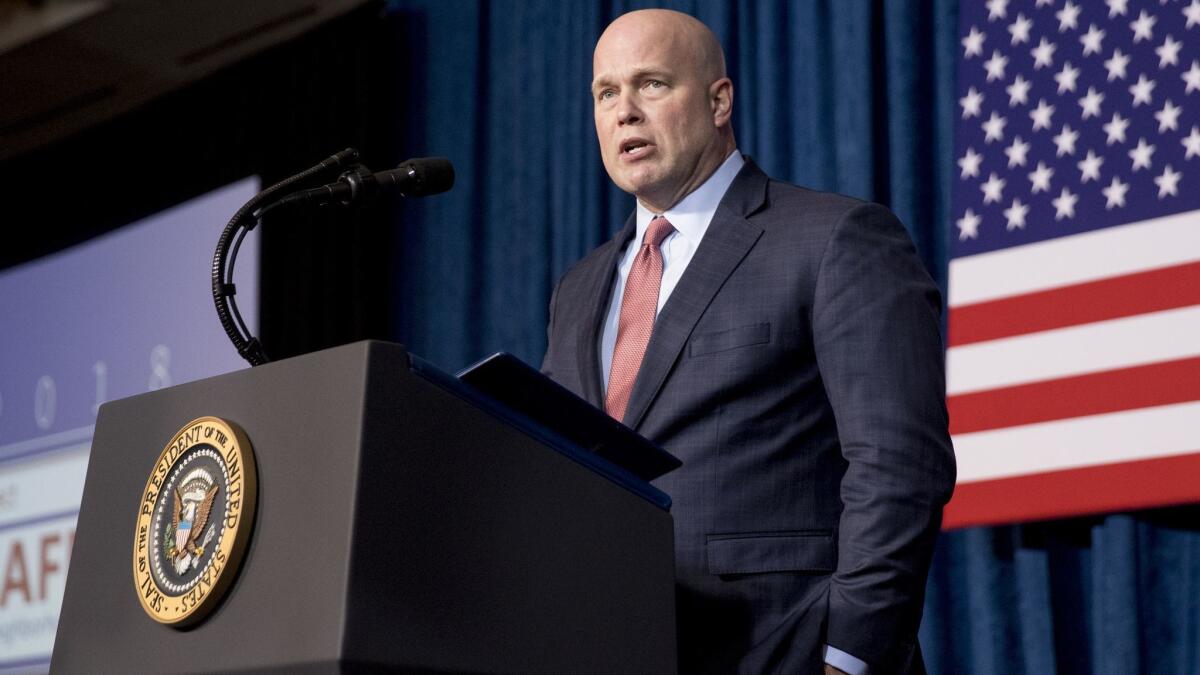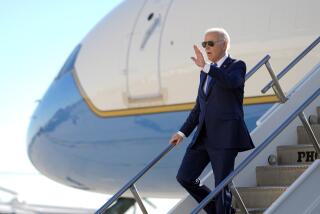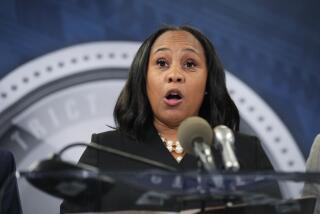Whitaker will not recuse himself from Russia probe, despite ethics advice that he should

Acting Atty. Gen. Matthew Whitaker will not recuse himself from overseeing special counsel Robert S. Mueller III’s investigation into Russian interference in the 2016 election despite advice from a senior ethics attorney that he should do so, Justice Department officials said Thursday.
Whitaker sought guidance from advisors and ethics officials shortly after being tapped to take over as the nation’s top law enforcement officer. He did so because of critical comments he had made about the Mueller inquiry in interviews and writing done before he joined the government last fall as then-Atty. Gen. Jeff Sessions’ chief of staff.
Whitaker did not receive any briefings on Mueller’s probe while the ethics review was taking place, the Justice Department officials said. They declined to say when he may be briefed. The officials spoke to reporters under ground rules that do not allow them to be identified.
Whitaker’s decision came as lawmakers received a memo written in June by the man President Trump has nominated to be the next attorney general, William Barr. His memo sharply criticized one aspect of the special counsel probe.
The decision by Whitaker to not recuse himself was a “close call,” the senior ethics lawyer — a career Justice Department employee — told Whitaker’s aides on Tuesday. But the lawyer believed Whitaker should step aside “in an abundance of caution,” a senior Justice Department official said.
Whitaker’s advisors, however, recommended to the acting attorney general Wednesday that he not recuse himself because the decision was a close one. They said incorrectly that if he did recuse himself, he would put himself in the position of being the first attorney general to step aside from a case over the appearance of a conflict.
Whitaker took his team’s recommendation, the official said, and is sending a letter to congressional lawmakers to address the matter.
Former officials in the Obama administration disputed the contention that no attorney general had recused himself over an appearance of a conflict of interest. They noted that in 2009, Atty. Gen. Eric Holder stepped aside from overseeing any investigations into John Edwards, a former Democratic presidential candidate.
Holder recused himself because he had overseen the vice presidential vetting process for the Obama campaign, said Matthew Miller, Holder’s former communications director. The concern was “the appearance problem it would cause,” Miller said.
Whitaker’s former boss, Sessions, recused himself from overseeing the Justice Department’s investigation into Russian interference and the Kremlin’s potential ties to the Trump campaign because he had been a member of the campaign. That case presented a more clear-cut basis for recusal, Justice Department officials said, though it angered Trump and severely strained the pair’s relationship.
In 2003, Atty. Gen. John D. Ashcroft recused himself from involvement in the investigation over the leak of the name of an undercover CIA agent, Valerie Plame. At the time, the Justice Department said he had recused himself solely to avoid an appearance of a conflict, not because of any actual conflict.
The probe by Mueller into Russia’s meddling in the presidential campaign is being overseen by Deputy Atty. Gen. Rod Rosenstein. The Justice Department officials said Rosenstein would continue to supervise the investigation on a “day-to-day basis” as he would any other high-profile investigation.
Whitaker’s decision is sure to be met with criticism from Democrats, who have expressed concerns over his critical comments about the Mueller inquiry and whether he can fairly supervise it.
In a statement, Rep. Jerrold Nadler (D-N.Y.), who will take the helm of the House Judiciary Committee next month, said he was concerned that career Justice Department officials were worried over Whitaker’s “ability and fitness to oversee the special counsel’s investigation.” He said he would ask Whitaker about the recusal process at an upcoming hearing.
In 2017, Whitaker mused on radio and TV that cutting Mueller’s budget or his authority could effectively choke or limit the probe. He called Mueller’s appointment “fishy” and “ridiculous.” And he argued in a CNN op-ed article that allowing Mueller to examine the finances of President Trump’s family raised “serious concerns that the special counsel’s investigation was a mere witch hunt.”
Whitaker was tapped to be acting attorney general on Nov. 7, shortly after Trump asked Sessions to resign. Whitaker then appointed a U.S. attorney to oversee a group of advisors running a war room of sorts to counsel him in his new role and to provide guidance on ethics matters, Justice Department officials said.
Whitaker did not face any conflicts of interest that would have required a mandatory recusal — such as having a financial stake in a company under investigation or having once defended a suspect in the case. But because there was the potential for an appearance of a conflict, under Justice Department rules, he had to ask for ethics advice and then recuse himself if he believed that was required.
His team of advisors has met with ethics officials several times since Whitaker was tapped by Trump to run the department. In Tuesday’s meeting, the senior ethics official told the group that if asked by Whitaker, he would recommend that the acting attorney general recuse himself, the senior Justice Department official said.
The ethics official said the department could find no other instance of an attorney general recusing himself due to an appearance of a conflict of interest, the senior official said.
The announcement of Whitaker’s decision not to recuse himself, coupled with Barr’s memo criticizing Mueller’s probe, added to the fraught atmosphere surrounding the Justice Department.
Barr, a former attorney general in the George H.W. Bush administration, sent the unsolicited memo to Rosenstein in June 2018. The 19-page memo says that Trump should not be forced to submit to an interview about Russia’s interference in the election.
Barr’s memo focused intensely on Mueller’s reported investigation into whether Trump obstructed justice when he fired FBI Director James B. Comey Jr. Barr said that such an investigation would be “fatally misconceived” and could do “lasting damage” to the presidency.”
An investigation into potential obstruction by a president would be appropriate if it focused on intentional acts that could sabotage a law enforcement official’s efforts to gather facts, such as destroying evidence or inducing a witness to lie to investigators, he said.
But firing Comey could not be considered obstruction because the president had constitutional discretion to remove such an official, Barr wrote.
“If a DOJ investigation is going to take down a democratically-elected president, it is imperative to the health of our system and to our national cohesion that any claim of wrongdoing is solidly based on evidence of a real crime — not a debatable one,” Barr wrote.
Barr did not entirely shut the door to the president being charged with obstructing justice if “the president and his campaign were actually guilty of illegal collusion.” If Mueller had proof of such a crime, Trump could be accused of acting out of a “corrupt” motive when he fired Comey, Barr wrote. But “Mueller should not be permitted to interrogate the president about obstruction until he has enough evidence to establish collusion,” he concluded.
The Trump administration sent the letter to Congress on Wednesday.
Los Angeles Times staff writer David Savage contributed to this report.
Twitter: @delwilber
More to Read
Get the L.A. Times Politics newsletter
Deeply reported insights into legislation, politics and policy from Sacramento, Washington and beyond. In your inbox three times per week.
You may occasionally receive promotional content from the Los Angeles Times.







